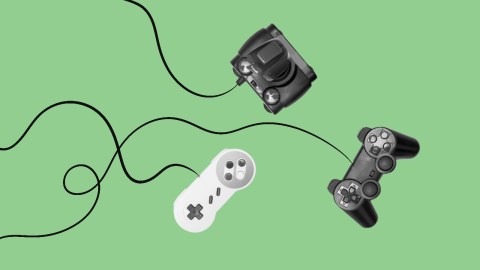Kids who play 21 hours of video games per week perform better on cognitive tests

- Whether video games are beneficial or harmful to children has been debated for some time. The balance of research tends to suggest that child gamers suffer from slightly more behavioral problems but tend to have an edge in cognitive ability.
- A new study with over 2,000 participants finds that nine- and ten-year-olds who play more than 21 hours of video games per week outperform their peers who don't play video games on cognitive tests of response inhibition and working memory.
- While not all video games are likely to be equally beneficial, the study shows that even high rates of game-playing do not hinder cognitive ability, and might even enhance it in certain areas.
Video games are often maligned by parents and the media, but a recently published study of 2,217 nine- and ten-year-olds found that kids who played at least 21 hours of video games per week performed better on tests of cognitive performance involving response inhibition and working memory than kids who didn’t play video games at all.
The research, spearheaded by scientists in the Department of Psychiatry at the University of Vermont, is published in the journal JAMA Network Open.
Video games are everywhere
In the span of three decades, video games have grown from rare to ubiquitous in modern society. No longer relegated to the realm of nerdom, nearly three-quarters of children aged 2 to 17 play them, whether on computers, consoles, or smartphones, leaving parents to wonder, “How much is the right amount?”
The American Academy of Pediatrics (AAP) recommends that children over two play no more than one hour of video games on school days and no more than two hours on non-school days.
More broadly, scientists have explored whether gaming is associated with changes to behavior and cognitive function in kids. Prior research has linked heavy gaming with slightly increased rates of aggression, depression, and violence. At the same time, however, frequent gamers do tend to outperform their peers on various measures of cognitive ability. Research on both behavior and cognitive ability has tended to suffer from small sample sizes, however.
The new study did not. Thousands of kids, enrolled in the Adolescent Brain Cognitive Development (ABCD) study, were separated into two groups: those who played at least 21 hours of video games per week (well over AAP recommendations) and those who played none at all. Participants were challenged with a Stop-Signal Task (SST) — designed to measure inhibition control — in which they were told to work on a simple, rapid-fire task on a computer until a “stop” signal was given. They were also given an N-Back task — a test of working memory — in which they were asked to rapidly recall something that they were previously presented. Both cognitive assessments were completed while subjects sat in an fMRI brain scanner.
The gamers outperformed the non-gamers by about 5% to 10% on both tasks. Moreover, their brains showed higher activity in regions associated with attention and memory and in frontal brain regions linked to more cognitively demanding tasks.
While the gamers and non-gamers did not differ on age, BMI, or IQ, the gamers were disproportionately male and had less combined parental income. The income disparity actually adds to the robustness of the finding. Higher parental income is often sharply linked with all sorts of improved child outcomes, from health to behavior to intelligence, so the fact that child gamers from poorer homes tended to cognitively outperform non-gamers from richer ones is certainly interesting.
Is Tetris the same as Grand Theft Auto?
The researchers caution that not all video games are likely to be equally beneficial: a violent, first-person shooter is undeniably different than an educational, strategy, or puzzle-solving game, for example. Their study did not tease out which games participants were actually playing. Moreover, they cautioned that the study was merely a snapshot in time, assessing correlation, not causation.
However, future data releases from the ABCD study group as the participants age should allow the scientists to detect changes in cognitive ability. Will gamers continue to outperform their non-gaming peers, perhaps growing their advantage? Time will tell.





